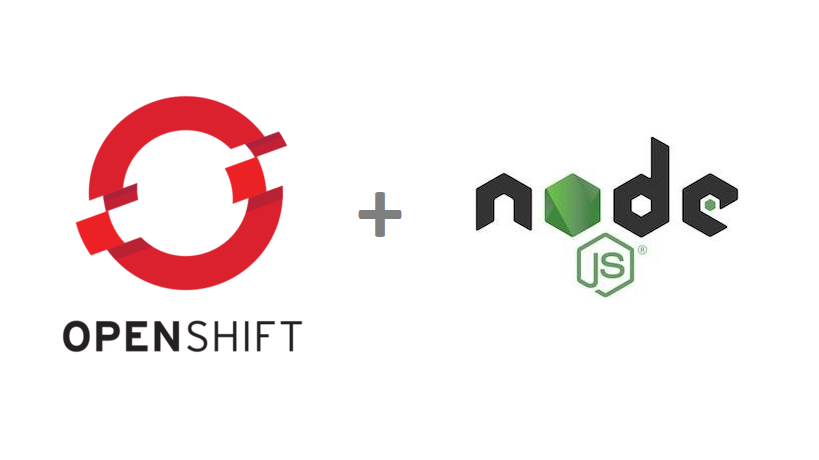How to Deploy Static Website on Openshift Using Nodejs

OpenShift is one of the best cloud servers available for free. You can easily deploy a static website using the PHP catridge, however the default page should be index.php.
It is no big deal to create a .php extension page, but I wanted the web stack to work with a .html page. This objective can be achieved using NodeJs catridge as follows:
- Login to your Openshift account.
- Click on the Add Application button.
- Now, you’ll be asked to Choose a type of application. Here you select the NodeJS catridge.
- Next step is to Configure the application. Add the appropriate details. (We won’t go into details) and then click on Create Application.
- Now, Grab the Git repo URL and clone the repo on your local machine.
cdinto the cloned directory. Find the server.js which is your HTTP server.- You have to configure the HTTP server according to your requirements. I suggest you create a public_html(or any other name) directory inside the cloned directory so that the Openshift files are not exposed.
- You can Refer the server.js below if you don’t want to scratch your head.
#!/bin/env node // OpenShift sample Node application var express = require('express'); var fs = require('fs'); var publicDirectory = "public_html"; // Edit this accordingly /** * Define the sample application. */ var MyApp = function() { // Scope. var self = this; /* ================================================================ */ /* Helper functions. */ /* ================================================================ */ /** * Set up server IP address and port # using env variables/defaults. */ self.setupVariables = function() { // Set the environment variables we need. self.ipaddress = process.env.OPENSHIFT_NODEJS_IP; self.port = process.env.OPENSHIFT_NODEJS_PORT || 8080; if (typeof self.ipaddress === "undefined") { // Log errors on OpenShift but continue w/ 127.0.0.1 - this // allows us to run/test the app locally. console.warn('No OPENSHIFT_NODEJS_IP var, using 127.0.0.1'); self.ipaddress = "127.0.0.1"; }; }; /** * Populate the cache. */ self.populateCache = function() { if (typeof self.zcache === "undefined") { self.zcache = { 'index.html': '' }; } // Local cache for static content. self.zcache['index.html'] = fs.readFileSync('./index.html'); }; /** * Retrieve entry (content) from cache. * @param {string} key Key identifying content to retrieve from cache. */ self.cache_get = function(key) { return self.zcache[key]; }; /** * terminator === the termination handler * Terminate server on receipt of the specified signal. * @param {string} sig Signal to terminate on. */ self.terminator = function(sig){ if (typeof sig === "string") { console.log('%s: Received %s - terminating sample app ...', Date(Date.now()), sig); process.exit(1); } console.log('%s: Node server stopped.', Date(Date.now()) ); }; /** * Setup termination handlers (for exit and a list of signals). */ self.setupTerminationHandlers = function(){ // Process on exit and signals. process.on('exit', function() { self.terminator(); }); // Removed 'SIGPIPE' from the list - bugz 852598. ['SIGHUP', 'SIGINT', 'SIGQUIT', 'SIGILL', 'SIGTRAP', 'SIGABRT', 'SIGBUS', 'SIGFPE', 'SIGUSR1', 'SIGSEGV', 'SIGUSR2', 'SIGTERM' ].forEach(function(element, index, array) { process.on(element, function() { self.terminator(element); }); }); }; /* ================================================================ */ /* App server functions (main app logic here). */ /* ================================================================ */ /** * Create the routing table entries + handlers for the application. */ self.createRoutes = function() { self.routes = { }; self.routes['/asciimo'] = function(req, res) { var link = "http" + "://i.imgur.com/kmbjB.png"; res.send("<"+"html"+"><"+"body"+"><"+"img src='" + link + "' />"+"<"+ "/"+"body"+">"+"<"+"/"+"html"+">"); }; self.routes['/'] = function(req, res) { res.setHeader('Content-Type', 'text/html'); res.send(self.cache_get('index.html') ); }; }; /** * Initialize the server (express) and create the routes and register * the handlers. */ self.initializeServer = function() { self.createRoutes(); self.app = express.createServer(); // Add handlers for the app (from the routes). for (var r in self.routes) { self.app.get(r, self.routes[r]); } }; /** * Initializes the sample application. */ self.initialize = function() { self.setupVariables(); self.setupTerminationHandlers(); // Create Express server self.app = express.createServer(); // Gzip content self.app.use(express.compress()); // Browser Cache var oneDay = 86400000; self.app.use('/', express.static(__dirname + '/' + publicDirectory + '/', { maxAge: oneDay })); }; /** * Start the server (starts up the sample application). */ self.start = function() { // Start the app on the specific interface (and port). self.app.listen(self.port, self.ipaddress, function() { console.log('%s: Node server started on %s:%d ...', Date(Date.now() ), self.ipaddress, self.port); }); }; }; /* My Application. */ /** * main(): Main code. */ var myAppObj = new MyApp(); myAppObj.initialize(); myAppObj.start(); - Edit the
publicDirectoryvariable, Commit the code and Push it to Openshift. Your static Website using nodejs should be LIVE.
